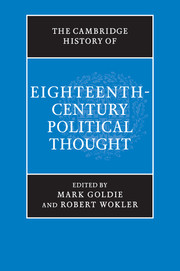Book contents
- Frontmatter
- Introduction
- Part I The ancien régime and its critics
- Part II The new light of reason
- Part III Natural jurisprudence and the science of legislation
- Part IV Commerce, luxury, and political economy
- Part V The promotion of public happiness
- 17 Philosophical kingship and enlightened despotism
- 18 Cameralism and the sciences of the state
- 19 Utilitarianism and the reform of the criminal law
- 20 Republicanism and popular sovereignty
- Part VI The Enlightenment and revolution
- Biographies
- Bibliography
- Index
- References
19 - Utilitarianism and the reform of the criminal law
from Part V - The promotion of public happiness
Published online by Cambridge University Press: 28 March 2008
- Frontmatter
- Introduction
- Part I The ancien régime and its critics
- Part II The new light of reason
- Part III Natural jurisprudence and the science of legislation
- Part IV Commerce, luxury, and political economy
- Part V The promotion of public happiness
- 17 Philosophical kingship and enlightened despotism
- 18 Cameralism and the sciences of the state
- 19 Utilitarianism and the reform of the criminal law
- 20 Republicanism and popular sovereignty
- Part VI The Enlightenment and revolution
- Biographies
- Bibliography
- Index
- References
Summary
The first object of this chapter is to chart the development of philosophical thought about crime and punishment in the latter half of the eighteenth century, with special emphasis on the writings of Montesquieu, Beccaria, and Bentham. It will be shown that the common thread running through their writing is the application of a doctrine of civil and political liberty to this aspect of state power. A second object is to relate the philosophical arguments of these influential thinkers to the more practical discussions, mainly in Britain, regarding the abolition of the death penalty and the use of various alternative forms of punishment such as transportation and imprisonment. It will be shown that intellectual debate was not simply between ‘reformers’ and ‘conservatives’ but instead proceeded in a more complex manner on philosophical and ideological levels and was directed towards different objects.
Liberty and the criminal law
Montesquieu was the first major writer to place the reform of the criminal law on the agenda of the Enlightenment. As early as the Persian Letters (1721) (especially no. 80, but also nos. 76 and 102), but mainly in books vi and xii of the The Spirit of the Laws (1748), he contended that severe punishments did not necessarily deter crime. Following his typology of constitutions he argued that mild punishments were appropriate to moderate governments and severe ones only to despotisms (SL, vi.9, 11–13). In moderate governments the wise legislator attempted to prevent crime by the adjustment and use of customs and traditions.
- Type
- Chapter
- Information
- The Cambridge History of Eighteenth-Century Political Thought , pp. 547 - 572Publisher: Cambridge University PressPrint publication year: 2006
References
- 4
- Cited by

